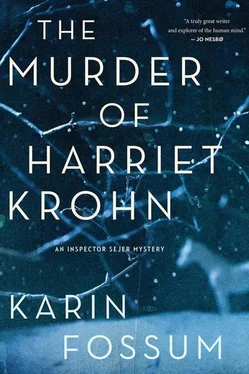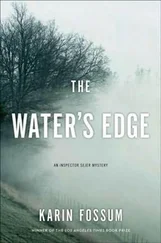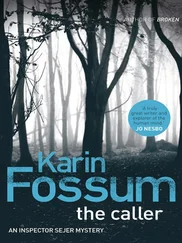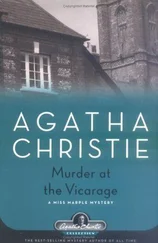“The bouquet’s two hundred and fifty kroner at the moment,” the assistant says. She looks up at him, but just as quickly looks away, still uncertain because of his sullenness.
He nods and says, “That’s fine.” In a clumsy attempt at sociability, he adds, “It looks lovely.”
She sends him a smile of relief. There is something nice about him after all, she thinks, and rejoices.
I ought to have chatted and smiled, Charlo thinks. Charmed her, because I can when I want to. Then she would have forgotten me with all the others.
“Will it be long before they’re put in water?” she asks.
Now her voice is brighter, more open.
He stands there cogitating dumbly. Will they be put in water at all? He doesn’t know. It’s coming up to eight o’clock and he realizes the shop will shut in a few minutes. He’ll have to wait awhile before setting his plan in motion. Until the traffic dies down in the streets. Until people have got home and he can wander past the houses unseen.
“About an hour or two,” he replies, and watches as she packs the stems in damp tissue. She wraps them in cellophane, which crackles ominously, then in white paper.
Charlo has turned away once more, and when he turns back, he sees that she’s putting the bouquet in a cone-shaped shopping bag. The bag has the words “Tina’s Flowers” prominently printed on it in blue and red. He gets out his wallet to pay, his hands shaking slightly. The girl avoids looking at him and instead stares at his wallet, which is brown and tattered. Her young, alert eyes notice that the zipper is broken, the leather is worn, and the seams are gaping. She sees the little red-and-white sticker announcing that he’s a blood donor. He pays, replaces his wallet, and gives her a little smile. She smiles back, noticing that his left front tooth is chipped, and that he’s never bothered to repair it. It makes his smile rather charming. Charlo glances quickly at the elderly woman who’s waiting. The snow on her shoulders has melted and the wet patches shine in the light. She looks at the time. She’s in a hurry and marches up to the counter. Her nose is sharp and red in her long, lean face. Deep creases at the corners of her mouth, blue bags under her eyes. He knows that he’ll always remember this face. At last he can leave. The door bangs, the bell jingles.
The air outside seems strangely fresh. He walks through the streets carrying the bag. He’s visible under a streetlight for a few seconds and then gets swallowed up by darkness, only to become visible again under the next. The bag swings in his hand. All that trouble she went to over the bouquet, all that skill and experience, all to no purpose. The flowers are merely an entry ticket. That’s how he’ll get into the house.
And right into Harriet Krohn’s kitchen.
She lives in Fredboesgate, Hamsund.
It’s a seventeen-kilometer drive. Harriet’s house is one of a cluster of listed timber buildings dating from the middle of the nineteenth century, and is situated on a very quiet street. They are small, pretty wooden houses with beautifully framed windows. Most of the inhabitants are elderly, and most are well off. In summer, the frontages are decorated with flourishing window boxes full of geraniums, nasturtiums, and marguerites. The house is only a few minutes away from the railway station. There are twelve houses in all, six on each side of the street. Harriet lives in number four. The house is lichen-green and the sills and bargeboards are painted yellow.
Charlo approaches Hamsund. It’s still sleeting heavily, and he concentrates hard on keeping the car on the road. He doesn’t want to end up in the ditch, not tonight. On the seat next to him is an old Husqvarna revolver, which isn’t loaded. It’s only for show, he thinks. She won’t be uncooperative. She won’t dare to be; she’s elderly. He also has a pair of black leather gloves and a cotton bag for anything he finds of value. It is rolled up in his pocket. He’s on the E134, driving by the river, which is surging along on his left, rough and black. He knows the river is full of salmon, but he’s never bothered to fish. When he thinks about fishing, he remembers his boyhood. He remembers his father, who always wanted to go fishing, while he sat there getting bored, his rod dipping lethargically over the water. Fishing was too slow for him, too dull. This was something he never articulated. He didn’t want to hurt his father; he didn’t want to complain. I used to be a considerate boy then, he thinks. And what am I thinking about my father for, he’s dead now and at peace. People pass away, just as I’ll pass away, and that’s good. It certainly is good, he decides, and squints at the road ahead.
The markings in the middle of the road are only just visible. The sleet is settling like gray porridge on the tarmac, and the windshield wipers struggle with the slush. But the Honda doesn’t let him down; the Honda is matchless and reliable. He’s already worked out a good place to park. He’ll do the last bit on foot, as it’s only a couple of hundred meters. There’s an old, derelict hotel at Hamsund, and a car can be parked in the courtyard there, out of sight of the street. He’s aware that the car could give him away and that he must conceal it. He turns to the right and onto the R35, catching sight of the floodlit Hamsund church and its gravestones. He passes an Opel showroom and a couple of shopping centers, and cruises slowly past the railway station on his right. It’s a really elegant building, like a great layer cake covered with icing. How strange, he thinks, that his mind is running on cakes. Everything seems odd this evening, as if he’s playing a part in a film. There’s hardly any traffic. People are indoors.
Now he sees the hotel; it’s called The Fredly. A handsome white timber building with much fine ornamentation and dark, unseeing windows. He turns into the courtyard and parks; there are no other cars there. A notice on the wall facing him announces that unauthorized vehicles will be towed away, but he knows that no one will come here tonight. Everyone is sheltering from the weather. Then he hears a noise. A sort of click and something ringing faintly. He heaves himself around in his seat and looks through the windows. Is someone coming after all? Has someone seen the car? Again he has an acute attack of nerves. I don’t have to do this, he mumbles into the darkness. I’m not quite myself. Can’t anybody stop me; isn’t there another way? But nobody comes, and there is no other way. The voice within him is frail and attenuated.
He looks back on his life, how wretched it’s been. Guilt and betrayal, weakness. Lies and deceit. Promises he hasn’t kept. Has there been anything good about it? Inga Lill was good. Julie is the most precious thing he has. He tries to breathe evenly. He believes he’s thought of everything, but he knows it’s easy to overlook a crucial detail that might give him away later on. But this “give him away” doesn’t seem so terrifying. It’s in the future, and he hasn’t arrived there yet. It’s almost as if he doesn’t believe in it. He’s living for the moment, doing what he has to do, and time is running out. That’s what he’ll say if they catch him. I had to do it. I saw no other solution; it was a matter of survival. He turns off the ignition. Sits in the car around the back of the abandoned hotel, listening to the surrounding darkness. He hears his own breathing; it’s rapid and rasping. He looks at his watch, the dial glowing green in the darkness of the car’s interior. He pulls the flowers out of the shopping bag and lays them in his lap. The bouquet is heavy, but otherwise nondescript, packed in white paper. What if she has visitors? he thinks. There are lots of things that could go wrong. But he doesn’t believe Harriet Krohn has many visitors. He’s studied her, followed her. He’s listened in as she sat in the café with her best friend. She’s a lonely old woman and will certainly hesitate to open her door. But I’m armed, he thinks, with these irresistible flowers and a World War II revolver. She’ll have to do what I say. He pulls on his gloves and gets out of the car. Locks up. He pushes the revolver into the waistband of his pants. Once again he listens. He hears nothing but the sound of his own boots splashing in the slush. If I can just get inside, he thinks, as he walks through the darkness. Getting inside the house will be the trickiest bit. Old people are frightened of everything.
Читать дальше












